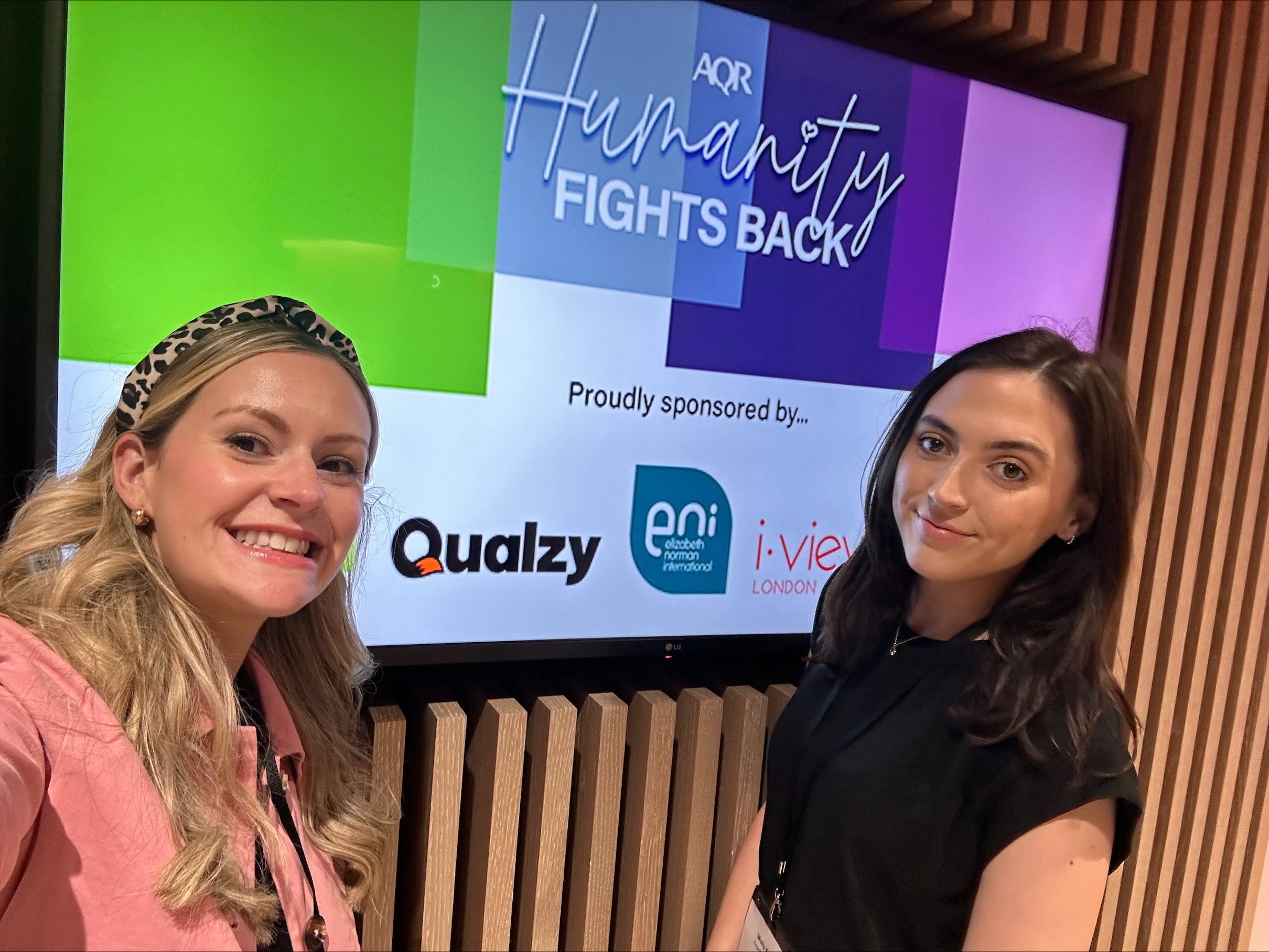
Our Top Takeaways from the AQR Conference: Humanity Fights Back!
Director of Operations Kelly and Senior Project Manager Molly recently attended the AQR Humanity Fights Back conference about the use of AI in market research. Here are their top takeaways…
After a few years’ hiatus from the conference scene, AQR stepped back into the spotlight with their recent Humanity Fights Back conference. The conference brought together some of the leading experts in qualitative research, providing a platform for insightful discussions on a range of topics from AI and the post-pandemic shifts in research to segmentation and authenticity.
It was a brilliant day filled with tons of insightful ideas and conversations around the qualitative research industry and the challenges it faces today. Here are our top takeaways from the conference as a fieldwork agency…

5 Key Takeaways from the AQR Conference
1.The Role of AI in Qualitative Research
Limits to Context, Background, and Interpretation
There is no denying the exponential rise of AI in pretty much every industry. However, when it comes to qualitative market research, AI can lack the human layer that is so crucial for the summarisation and interpretation of data.
Essentially, the human touch is still needed when using AI for analysis, from inputting the right probes to considering language and cultural nuances. Plus, researchers must also be careful not to let AI overpower their ability to understand the data.
Key Takeaway
‘Real’ respondents must stay at the heart of qualitative research. There is also a responsibility to ensure informed consent and transparency when using AI in research.
2. Avoiding the Echo Chamber
Adapting Methodologies
When conducting research with different demographics, methodologies should be adapted according to the demographics being studied. For example, Gen Z may not engage effectively in group video calls, so alternative methods should be considered instead.
Digital Accessibility and Building Rapport
It’s also important to consider what tools and platforms hard-to-reach audiences have access to, ensuring inclusivity in research practices. Establishing a connection with respondents is crucial, so where appropriate, researchers should consider using personal experiences and empathy to help build trust and make respondents feel comfortable.
Key Takeaway
Researchers should commit to continually adapting research methodologies to suit diverse demographics in their own spaces, ensure digital accessibility, and cultivate spaces that foster genuine connections and honest feedback.
3. Flexibility in Segmentation
Grey Areas
Is there such a thing as accurate segmentation? Being faced ourselves with a segment did not sit too well! Many of us felt that often people operate on a spectrum and that their behaviours and attitudes may change depending on the situation or at various times, suggesting that flexibility and the allowance of grey areas are essential for successful research.
Key Takeaway
In order to get the most out of their research, clients must allow for greater flexibility and enable research respondents to fit into the ‘grey.’
4. Ensuring Authenticity
Comfort in Sharing
If respondents are going to open up and share their true thoughts and feelings, they need to feel comfortable doing so. In a world of growing self-censorship, recruiters must work harder to ensure respondents feel comfortable sharing their views.
Methodological Considerations
In order for research to succeed, the insights gathered need to be authentic. Tailoring the methodology to the respondents ensures they feel comfortable and will lead to more authentic and reliable data, for instance using anonymous chat groups for sensitive topics.
Key Takeaway
We are responsible for creating safe, judgment-free environments for our participants. This is key from recruitment through to fieldwork, encouraging respondents to be their most authentic selves and fostering open and honest communication throughout the research process.
In Conclusion
To sum up, the AQR conference highlighted the evolving nature of market research and explored some of the key challenges facing researchers today.
However, by embracing AI responsibly, pushing our own beliefs and opinions, allowing for flexible segmentation, and being mindful of the challenges that inhibit authentic responses, researchers can continue to push boundaries and embrace the changes that come their way, leading to deeper insights and a bigger impact.
How Angelfish Can Help with Your Fieldwork
If you’ve got a qualitative market research project coming up and would like to discuss any of the topics mentioned above and what they mean for you and your research, don't hesitate to contact our team.
As a specialist fieldwork agency, we’ve got years of experience helping our clients to find the best possible participants for the research and can provide help and advice on everything from accessibility to screeners.
Alternatively, for further help and advice about how to get the best possible results from your qualitative fieldwork, download our free guide to discover expert advice from recruitment techniques to validation tips.













